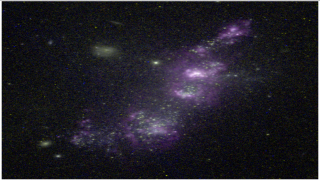Bibcode
Filho, M. E.; Sánchez Almeida, J.
Referencia bibliográfica
Monthly Notices of the Royal Astronomical Society, Volume 478, Issue 2, p.2541-2556
Fecha de publicación:
8
2018
Número de citas
3
Número de citas referidas
3
Descripción
We have serendipitously discovered that Leoncino Dwarf, an ultrafaint,
low-metallicity record-holder dwarf galaxy, may have hosted a transient
source, and possibly exhibited a change in morphology, a shift in the
centre of brightness, and peak variability of the main (host) source in
images taken approximately 40 yr apart; it is highly likely that these
phenomena are related. Scenarios involving a Solar System object, a
stellar cluster, dust enshrouding, and accretion variability have been
considered, and discarded, as the origin of the transient. Although a
combination of time-varying strong and weak lensing effects, induced by
an intermediate-mass black hole (104-5 × 105
M⊙) moving within the Milky Way halo ( 0.1-4 kpc), can
conceivably explain all of the observed variable galaxy properties, it
is statistically highly unlikely according to current theoretical
predictions, and, therefore, also discarded. A cataclysmic event such as
a supernova/hypernova could have occurred, as long as the event was
observed towards the later/late-stage descent of the light curve, but
this scenario fails to explain the absence of a post-explosion source
and/or host H II region in recent optical images. An episode related to
the giant eruption of a luminous blue variable star, a stellar merger or
a nova, observed at, or near, peak magnitude may explain the transient
source and possibly the change in morphology/centre of brightness, but
cannot justify the main source peak variability, unless stellar
variability is evoked.
Proyectos relacionados

Grupo de Estudios de Formación Estelar GEFE
El proyecto interno GEFE está enmarcado en el proyecto coordinado, ESTALLIDOS, financiado por el plan nacional desde el año 2001. El ultimo proyecto aprobado es ESTALLIDOS 6.0 (AYA2016- 79724-C4-2-P). En el proyecto GEFE trabajamos en base al caso científico del proyecto ESTALLIDOS 6.0. Los estallidos de formación estelar (Starbursts o SB) son
Casiana
Muñoz Tuñón